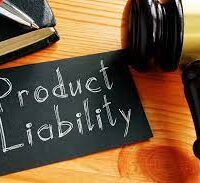Product Liability Defective Products and Legal Redress

From household appliances to pharmaceuticals, we rely on a wide range of products for our comfort, well-being, and convenience. However, not all products live up to their promises of safety and efficacy. When consumers suffer harm due to defective or unsafe products, the legal realm of “Product Liability” comes into play. In this article, we will explore the intricate domain of product liability, with a focus on lawsuits involving defective products, drugs, and medical devices.
Understanding Product Liability:
Product liability cases encompass three primary categories:
- Defective Products: These cases revolve around products with inherent design flaws, material defects, or manufacturing issues that occurred during production.
- Failure to Warn: Sometimes, a product may be inherently safe, but it becomes hazardous when used improperly or when manufacturers fail to provide adequate warnings and instructions.
- Breach of Warranty: Manufacturers and sellers often make implicit or explicit warranties regarding their products’ safety and performance. A breach of warranty claim arises when a product fails to meet these promises.
Common Cases of Product Liability:
- Defective Medical Devices: The medical field is no stranger to product liability cases. Faulty medical devices, such as hip implants, pacemakers, or surgical instruments, can lead to dire consequences for patients, potentially resulting in legal action.
- Dangerous Pharmaceuticals: Cases related to unsafe drugs and medications can have far-reaching health implications, from debilitating side effects to long-term complications. Pharmaceutical companies can be held responsible for failing to disclose risks or defects.
- Consumer Products: Everyday items like automobiles, children’s toys, kitchen appliances, and electronics may become the focal point of product liability claims if they malfunction or harbor design flaws leading to injuries.
- Food and Beverages: Contaminated or unsafe food products can result in illnesses, injuries, or even fatalities. Food manufacturers may face legal action for failing to uphold safety standards.
- Toxic Chemicals and Substances: Exposure to harmful chemicals or toxic substances within products can have enduring health effects. Companies using these substances could be held liable for not providing sufficient warnings or implementing adequate safety measures.
Legal Recourse for Product Liability:
Victims of defective products possess legal means to seek compensation for their injuries, encompassing medical expenses, lost wages, and the physical and emotional toll of pain and suffering. To build a successful product liability claim, plaintiffs must establish:
- The product was defective or unreasonably dangerous.
- The defect or danger directly caused the injury.
- The product was used as intended or in a reasonably foreseeable manner.
- The plaintiff incurred actual harm or losses due to the defect.
Conclusion:
Product liability plays a pivotal role in safeguarding consumer rights and ensuring that individuals harmed by unsafe or faulty products receive the restitution they are entitled to. If you’ve been harmed due to a defective product, it is crucial to consult with legal experts who can guide you through the intricate legal process, enabling you to assert your rights and pursue a product liability claim. These cases can often involve multiple parties, including manufacturers, distributors, and retailers, necessitating a skilled legal team experienced in product liability law to navigate the complexities of these cases effectively.



